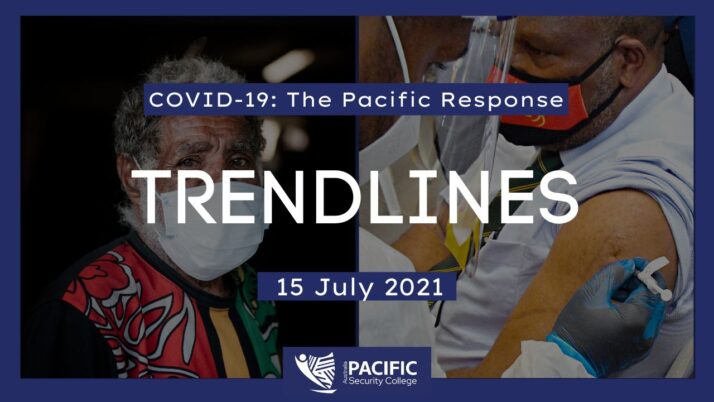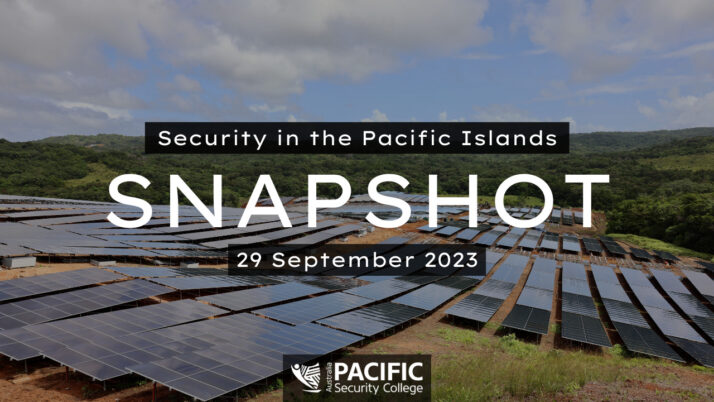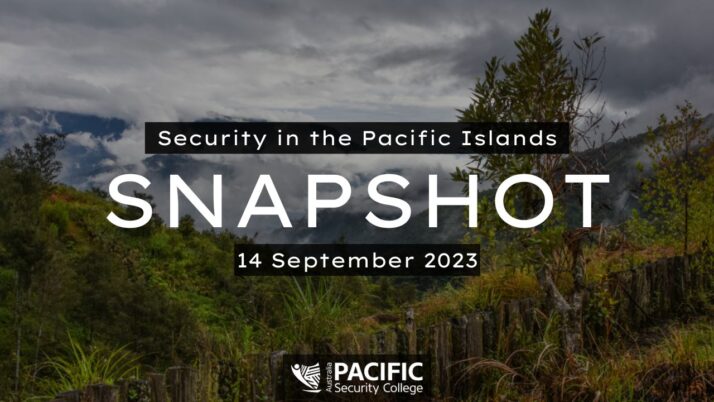COVID-19 – the Pacific Response: 15 July 2021

Fiji is introducing a ‘no jab, no job’ policy for public servants, whilst Japan has committed to vaccine assistance for the region, Hugh McClure writes.
Fiji’s situation continues to concern the region. The rolling seven-day average of cases there has reached 696, a marked increase from 269 a fortnight ago, and higher on a per capita basis than what was recorded in India during that country’s peak.
So far, 11,385 cases and 58 deaths have been recorded in Fiji, with 9,725 active cases in isolation. All but 67 cases and two deaths have been recorded since April 2021. 238,520 people have been tested since the pandemic began.
Elsewhere in the Pacific Islands region, there has been a reduction in new cases reported in Papua New Guinea, which now reports 17,346 cases and 179 deaths. There has been a slight increase in cases in Guam, bringing its total to 8,186 cases and 141 deaths, and Northern Mariana Islands, bringing its total to 185 cases and two deaths. There has been one new case in New Caledonia, bringing its total to 129 cases, and a small number of new cases in French Polynesia, bringing its total to 19,034 and 144 deaths.
Here is a snapshot of policy responses to COVID-19 in the Pacific region, correct as of 12pm AEST, 14 July 2021.
The fortnight in review

Fiji Prime Minister Frank Bainimarama has made international headlines this week, after announcing a ‘no jab, no job’ policy. He has said that public servants would be sacked if they did not get vaccinated. Workers will be dismissed if they have not received their second dose by 1 November, while private sector employers must ensure workers have one dose by 1 August. Opposition parties and the Fiji Law Society have criticised the vaccine order, with the Labour Party callingthe ruling “unconstitutional”. Despite this, some private-sector employers said that they will only employ individuals who are fully vaccinated. Deputy Opposition Leader Biman Prasad criticised the government’s policy, calling for a lockdown to be enforced instead. Australia has sent a second medical team to Fiji to assist.
Non-compliance remains an issue in Fiji. The iTaukei affairs board has pleaded for the community to cut down on traditional communal gatherings and other events. On-the-spot fines for non-compliance of AU$13 for individuals and $2,680 for companies have been imposed.
Four health facilities were closed in the Lami-Suva-Nausori containment zone for deep cleaning, meaning that medical services were paused and instead offered at the Nausori Special School. Patients and staff at the Colonial War Memorial Hospital were left without breakfast or lunch after COVID-19 was traced to the hospital’s kitchen – resulting in it being closed for some time. Phone company, Digicel, has donated personal protective equipment.
Preparations are beginning for the arrival of the Moderna vaccine in Fiji, funded by the United States through the COVID-19 Vaccines Global Access facility. People over the age of 60, as well as pregnant mothers, will be encouraged to receive the Moderna vaccine.
The Papua New Guinea (PNG) National Control Centre has decided to “scale-down” COVID-19 testing and focus efforts on vaccine administration. The decision comes despite Health Minister Jelta Wong appealing for people to come forward for testing, stating that Delta variant cases in Indonesia, Australia and Fiji place PNG in a position of heightened risk. PNG’s Opposition Leader says he will challenge new restrictions on inter-provincial air travel, introduced to reduce the spread of COVID-19 between provinces.
A total of 1,338,529 vaccines have now been administered in the Pacific Islands region. 48,732 have been administered in American Samoa; 18,942 in Cook Islands; 419,998 in Fiji; 141,523 in French Polynesia; 197,507 in Guam; 35,103 in Marshall Islands; 57,526 in Federated States of Micronesia; 10,556 in Nauru; 115,218 in New Caledonia; 1,216 in Niue; 57,788 in Northern Mariana Islands; 28,319 in Palau; 61,688 in Papua New Guinea; 62,161 in Samoa; 25,628 in Solomon Islands; 28,667 in Tonga; 4,772 in Tuvalu; 14,026 in Vanuatu; 9,112 in Wallis and Futuna; and Kiribati and Tokelau are yet to administer their first doses.
Three mass-vaccination hubs are being created in Port Moresby, and vaccine eligibility has been increased to all people aged over 18. PNG’s rollout is currently ranked the seventh slowest in the world.
Vaccination awareness drives have commenced on Vanuatu’s outer islands, with several chiefs first to receive their inoculations. Meanwhile in Vanuatu, there is concern that it is too risky to repatriate ni-Vanuatu students studying in Fiji.
Australia’s Minister for International Development and the Pacific, Zed Seselja, has completed his first visit to the region, visiting PNG. Minister Seselja announced Australian assistance to the Angau Memorial Hospital in Lae. He rejected claims from China that Australia is “sabotaging” the Sinopharm rollout. It comes amidst reports that Pacific Island countries are benefiting from Australians’ hesitancy to receive the Melbourne-manufactured AstraZeneca vaccine, with increased shipments sent to the Pacific.
The Pacific Islands Forum Trade Officials meeting recognised the “unprecedented contractions in GDP” caused by the COVID-19 pandemic, and the ongoing social and economic ramifications. The meeting called for increased access to vaccines, and stressed the importance of an integrated, regional response to the pandemic to boost economic resilience and competitiveness post COVID-19.
Engagement with Japan is in focus this fortnight, following the 9th Pacific Islands Leaders Meeting (PALM9). At the summit, Japan committed to vaccine assistance in the region.
Briefly, Samoa and Tonga have extended their respective State of Emergency periods, while there is a hint that the Solomon Islands Government will lift the State of Emergency on 24 July. Taiwanese tourists have arrived in Guam through its vaccine tourism scheme, which provides vaccines for tourists visiting Guam, provided they have tested negative prior to travel. With Australia and New Zealand increasing seasonal worker pathways, the Samoan Government has raised concern about the impact of such programs on families. Finally, Vanuatu’s first e-commerce symposium has been launched by the country’s prime minister. The symposium seeks to boost e-commerce out of the pandemic.
Hugh McClure
More Stories

Security Snapshot - 29 Sep 2023
Pacific Security Snapshot | 29 September 2023
The security stories shaping the region ➣ 2nd United States-Pacific Islands Forum Summit ➣ Niue and Cook Islands forge diplomatic ties with United States ➣ Chinese navy vessel arrives in Papua New Guinea ➣ Pacific climate change advocacy at the United Nations ➣ El Niño is officially declared ➣ Fifteenth Pacific Health Ministers Meeting in…

Security Snapshot - 15 Sep 2023
Pacific Security Snapshot | 15 September 2023
The security stories shaping the region ➣ Pacific Islands Forum Women Leaders Meeting ➣ Pacific High-Level Dialogue on Climate Change ➣ Fiji to sign Status of Forces Agreement with France ➣ Palau expands United States maritime law enforcement agreement ➣ Papua New Guinea special elite force to combat tribal violence ➣ Australia extends police presence…






